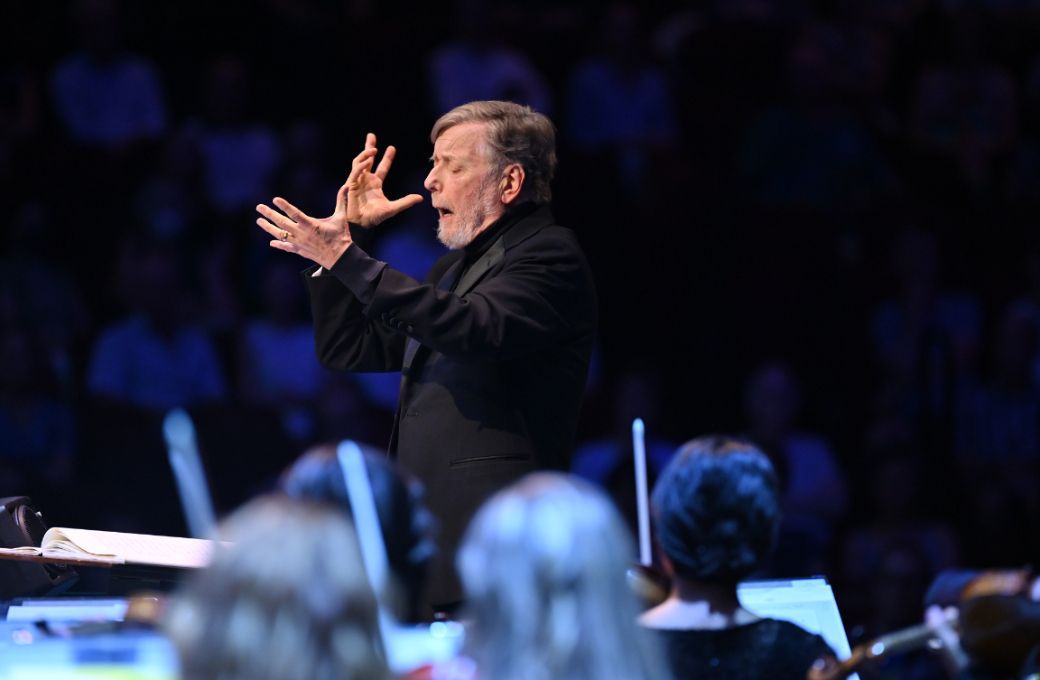The Fourth Symphonies by the most important British symphonists, Ralph Vaughan Williams and Michael Tippett, made up a short, but intense programme. With the heatwave scaring away many of the audience, a cool, but nearly empty hall was treated to some excellent music making from Sir Andrew Davis and the BBC Philharmonic. There are many crossover points both in their music and in their lives, and in the last decade of the older composer’s life, they became friends. Their interest in compassionate politics united them, although Vaughan Williams came from a generation and class that underplayed their political views, whereas Tippett was able to be franker and more open.

Unsurprisingly, in his F minor symphony Vaughan Williams was at pains to point out that there wasn’t a political message or warning in the music. Its violence and at times, downright bullying nature was not a comment on the rise of fascism, he said, but it was “what he wanted to write” and was to be seen as absolute music. However, it’s hard not see the symphony as being a product of the troubled early 1930s, because the shift in styles from the Pastoral Symphony that preceded it was so extreme. Factors in his personal life, as well as increasing tensions in Europe, must have informed its harsh tone.
There are two ways that conductors can approach the score: they can go hell for leather and bring out all the furious energy of the piece, as the composer himself did; or they can take a more measured approach and build up a head of steam to make the final bars all the more telling. Davis took the latter approach.
The opening tempo was only just an Allegro and felt a little underpowered until the final outburst. Its quiet ending was taken very slowly, but captured the bleak atmosphere well. The Andante moderato was paced and shaped well so that its final climax was particularly telling. The Scherzo was incisive and light of foot. Excellent playing from the BBC Philharmonic made the tricky cross rhythms sound simple, the orchestra clearly benefitting from playing a lot of the composer’s music recently as part of the symphony cycle in Manchester shared with The Hallé. The Finale was again shaped and not attacked, its tone of defiance leading inevitably to the fugal epilogue, which puts all pretence aside, finding, in this performance, a true sense of evil untamed. A slightly cautious, but very well played performance, ultimately chilling.
Forty years later, Tippett was commissioned to write a symphony by Georg Solti and the Chicago Symphony Orchestra. At this point in his career, he was riding high and a commission like this confirmed his status internationally. The resulting work is one of his most vibrant scores, capturing the energy of his masterpiece, the opera The Midsummer Marriage, in the more complex idiom he had developed in the 1960s. The sheer richness of the thematic material carries it over the 35-minute single movement span. Tippett described it as charting a life and in order to indicate the human aspect of his conception, actual sounds of breathing are written into the score. In this performance the actor C J Neale provided this live from the stage among the players.
Davis is a past master of Tippett’s music and it was evident that his preparation of this virtuosic score with the orchestra had been very thorough. All departments were on top form and the extraordinary profusion of ideas were navigated with ease. Particular mention should go to the horns who were excellent in their almost concerto-like parts. Davis understood exactly how to shape and pace the work and the result confirmed what audiences felt at its premiere, that Tippett's Fourth is one of the major post-war symphonic achievements.


